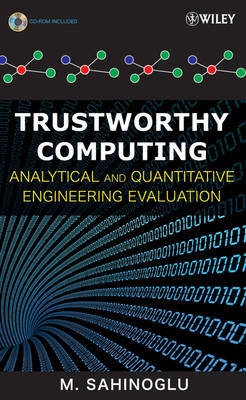"The book itself is a commendable achievement, and it deals with the security and software reliability theory in an integrated fashion with emphasis on practical applications to software engineering and information technology. It is an excellent and unique book and definitely a seminal contribution and first of its kind." -- C. V. Ramamoorthy Professor Emeritus, Electrical Engineering and Computer Science, University of California-Berkeley, and Senior Research Fellow, ICC Institute, The University of Texas-Austin, IEEE Life Fellow Trustworthy Computing: Analytical and Quantitative Engineering Evaluation presents an index-based, quantitative approach to advances in reliability and security engineering. Objective, metric-oriented, and data-driven, its goal is to establish metrics to quantify risk and mitigate risk through risk management.
Based on the author's class-tested curriculum, it covers: Fundamentals of component and system reliability and a review of software reliability Software reliability modeling using effort-based and clustered failure data and stochastic comparative measures Quantitative modeling for security and privacy risk assessment Cost-effective stopping rules in software reliability testing Availability modeling using Sahinoglu-Libby (S-L) Probability Distribution Reliability block diagramming for Simple and Complex Embedded Systems Complete with a CD-ROM containing case histories and projects that give readers hands-on experience, this is a great text for students in courses on security, reliability, and trustworthiness, as well as a reference for practicing software designers and developers, computer reliability and security specialists, and network administrators who work with data.
- ISBN10 0470085126
- ISBN13 9780470085127
- Publish Date 31 August 2007 (first published 1 July 2007)
- Publish Status Out of Print
- Out of Print 27 August 2014
- Publish Country GB
- Publisher John Wiley and Sons Ltd
- Imprint Wiley-Blackwell
- Format Hardcover
- Pages 320
- Language English
